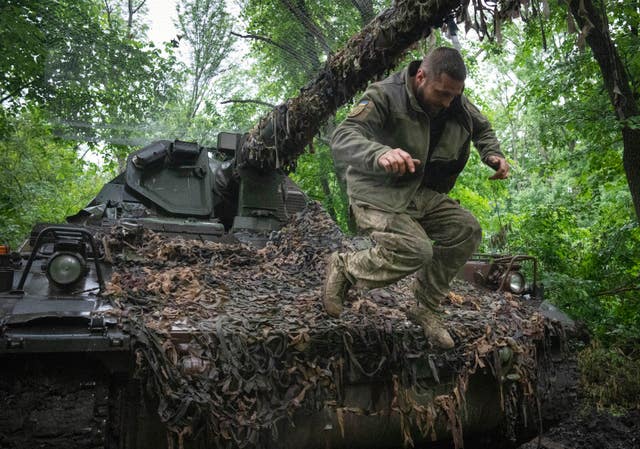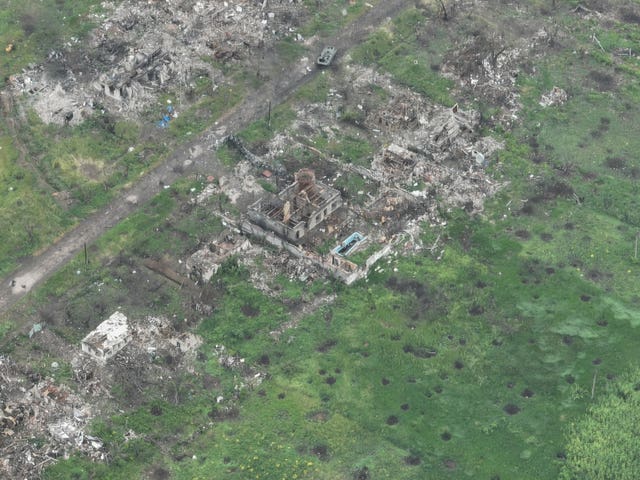Russia ‘plotting provocation at nuclear power station to delay counteroffensive’
Ukraine did not offer evidence to back up any of the claims.
Ukraine’s military intelligence says Russia is plotting a “large-scale provocation” at a nuclear power station it occupies in the south-east of the country to disrupt a looming counteroffensive.
A statement from the intelligence directorate of Ukraine’s Defence Ministry claimed Russian forces will strike the Zaporizhzhia nuclear power plant, the biggest in Europe, and report a radioactive leak in order to trigger an international probe that would pause the hostilities and give them the respite they need to regroup.
In order to make that happen, Russia “disrupted the rotation of personnel of the permanent monitoring mission” of the UN’s International Atomic Energy Agency (IAEA) that was scheduled for Saturday, the statement said.
It did not offer evidence to back up any of the claims.
The IAEA said it did not have any immediate comment on the allegations and Russian officials did not immediately comment on the Ukrainian claims.
The White House said it is watching the situation closely and has seen no indication radioactive material has been leaked.
The claim mirrors similar statements Moscow regularly makes, alleging without evidence that Kyiv is plotting provocations involving various dangerous weapons or substances in order to then accuse Russia of war crimes.
It comes as Moscow’s military in Ukraine braces for a looming counteroffensive by Kyiv’s forces, which has not started yet but could begin “tomorrow, the day after tomorrow or in a week”, the secretary of Ukraine’s National Security and Defence Council, Oleksiy Danilov, told the BBC.
The Zaporizhzhia station is one of the 10 biggest nuclear plants in the world.
It is in the partially occupied Zaporizhzhia region in south-eastern Ukraine.
The plant’s six reactors have been shut down for months but it still needs power and qualified staff to operate crucial cooling systems and other safety features.
Fighting near it repeatedly disrupted power supplies and has fuelled fears of a potential catastrophe like the one at Chernobyl, in northern Ukraine, where a reactor exploded in 1986 and spewed deadly radiation, contaminating a vast area in the world’s worst nuclear disaster.
In other developments, Russia on Saturday reported more attacks on its territory, with drones crashing in its western regions and areas on the border with Ukraine coming under shelling.
Two drones attacked an administrative building of an oil company in Russia’s western Pskov region that borders Belarus, Latvia and Estonia, Pskov governor Mikhail Vedernikov reported on Saturday.
The building was damaged as the result of an explosion, Mr Vedernikov said.

Another drone went down in the Tver region about 90 miles north of Moscow, local authorities said.
Russia’s Belgorod region on the border with Ukraine on Saturday came under multiple rounds of shelling, killing one person, according to its governor Vyacheslav Gladkov.
In the neighbouring Kursk region, which also borders Ukraine, one person was killed by cross-border mortar fire, its governor Roman Starovoit said.
And 60-year-old man was killed on Saturday evening by Russian shelling in the city of Kupyansk in the Kharkiv region, about 20 miles from the Russia border, Ukraine’s national police said.
Meanwhile, the British military said on Saturday that Russia’s private military force, Wagner, is withdrawing from areas around the eastern city of Bakhmut that Moscow claims to have captured earlier this month.
Wagner chief Yevgeny Prigozhin earlier this week announced the pullout, saying Wagner would hand control over the ruined city over to the Russian military.
Some were sceptical, however.

Mr Prigozhin is known for making unverifiable, headline-grabbing statements on which he later backtracks.
But the Ministry of Defence in Britain said in a series of tweets on Saturday that Wagner fighters “have likely started to withdraw from some of their positions” around Bakhmut.
“The Ukrainian deputy defence minister also corroborated the rotation out of Wagner forces in the outskirts of the town,” it added.





